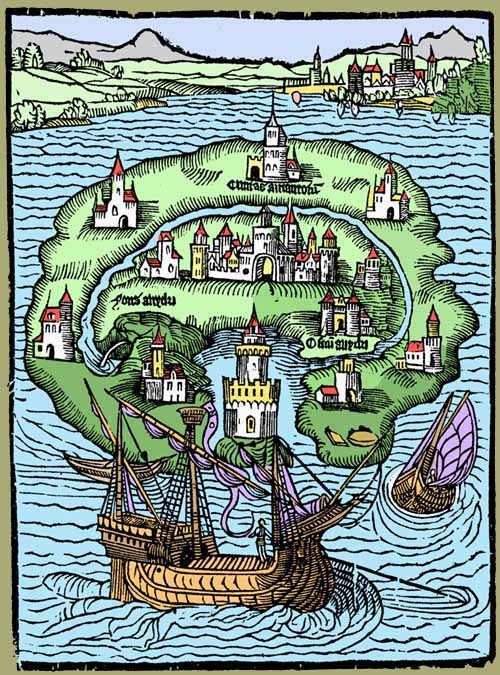

Who (like the ingenious mechanic among men) having exposed this grand machine of the universe, to the view of the only creature capable of contemplating it, they imagine that an exact and curious observer who admireth his work, is far more acceptable to him than one of the herd, who, like a beast incapable of reason, looketh on this glorious scene with the eyes of a dull and unconcerned spectator.

They reckon this knowledge one of the pleasantest and most profitable parts of philosophy as it searcheth the secrets of nature, is highly agreeable in the pursuit, and probably acceptable to the Author of our being. My companion, Apinatus, happened to take with him some of Hippocrates' works, and Galen's Microtechne, which they hold in high esteem for though no nation on earth needeth physic less than they do, yet none honoureth it more. Of the poets, they have Aristophanes, Homer, Euripides, and the Aldine edition of Sophocles and of historians, Thucydides, Herodotus, and Herodian. They highly esteem Plutarch, and were much taken with Lucian's wit, and his pleasant way of writing. They have no grammarians, except Lascares, as I brought not Theodorus with me and no dictionaries except Hesychius and Dioscorides. I had also Theophrastus on plants, which to my great regret was imperfect for, having allowed it to lay-about while we were at sea, a monkey had found it and torn out many of the leaves. For, so far from expecting to return so soon, I rather thought I should never return and I gave them all my books, among which were many of Plato's and some of Aristotle's works.

I happened to take out a large number of books, instead of merchandize, when I made my fourth voyage.

For I believe they were a colony of Greeks and though their language more nearly resemble the Persian, they retain many names, both for their towns and magistrates, which are of Greek derivation. Indeed, I am inclined to think they learned the language more easily, from its having some analogy to their own. In three years they became masters of the language, and could read the best Greek authors. They were most of them selected among the learned men, by their chief council though some learned it of their own accord. They learned to write the character and pronounce the language so well, had such quick apprehensions and faithful memories, and became so ready and correct in the use of it, that it would have been miraculous, had not the greater part of those we taught been men of extraordinary capacity, and of a proper age for instruction. But after a very short trial, we found they made such progress, that our labour was likely to be much more successful than we could have expected. We read a little of it to them, rather in compliance with their importunity, than from any hope of their reaping much advantage by it. When we had given them some hints of the learning and discipline of the Greeks (of whom alone we instructed them, for we knew there was nothing among the Romans, except their historians and poets, that they would much esteem), it was strange to see with what avidity they set about learning that language. Their pursuit of knowledge is indefatigable. None can endure more labour when it is necessary, but unless that be the case they love ease. They are industrious, apt scholars, and cheerful and pleasant companions. Sir Thomas More: Excerpt from "Utopia" (1516)


 0 kommentar(er)
0 kommentar(er)
